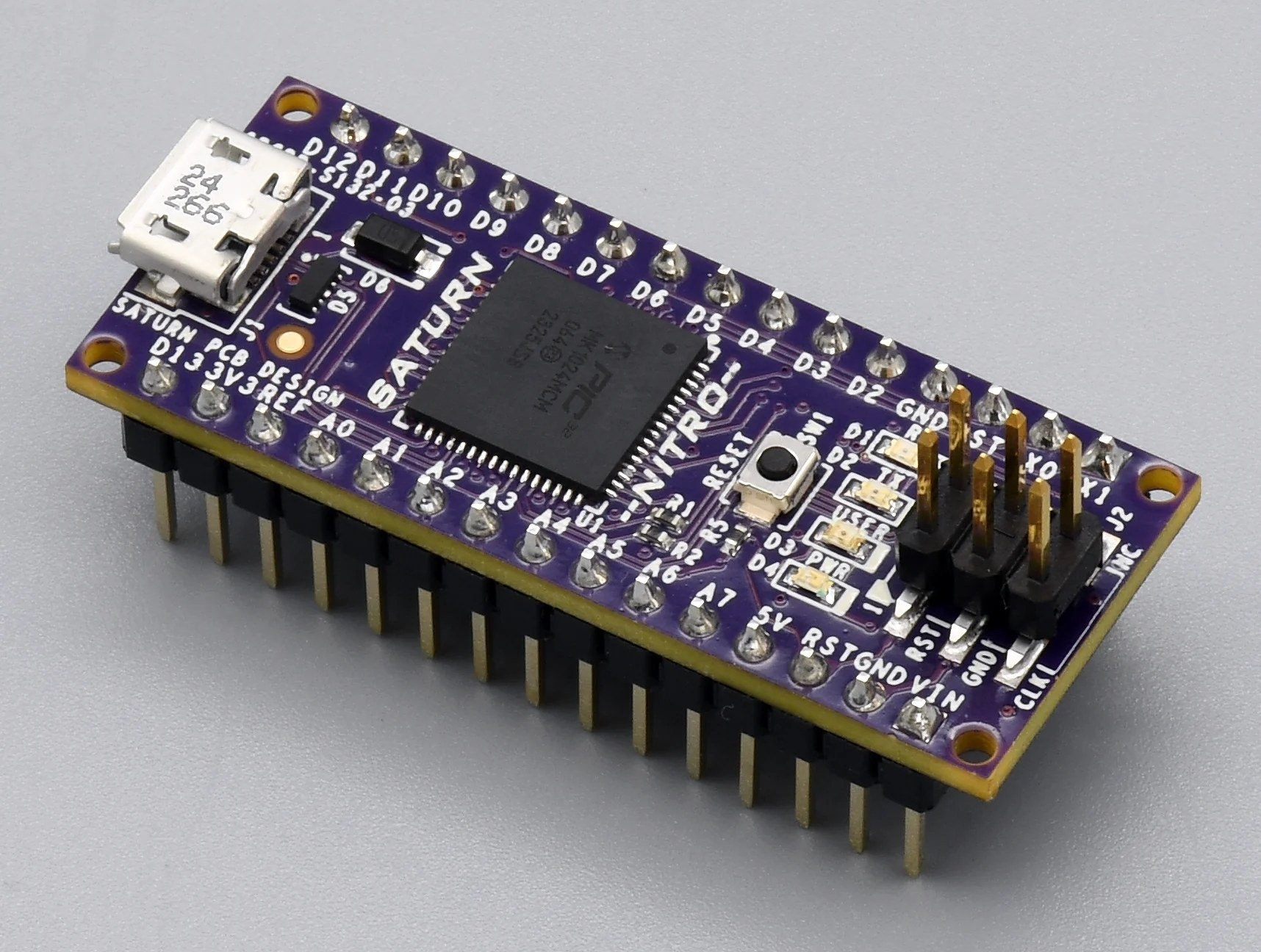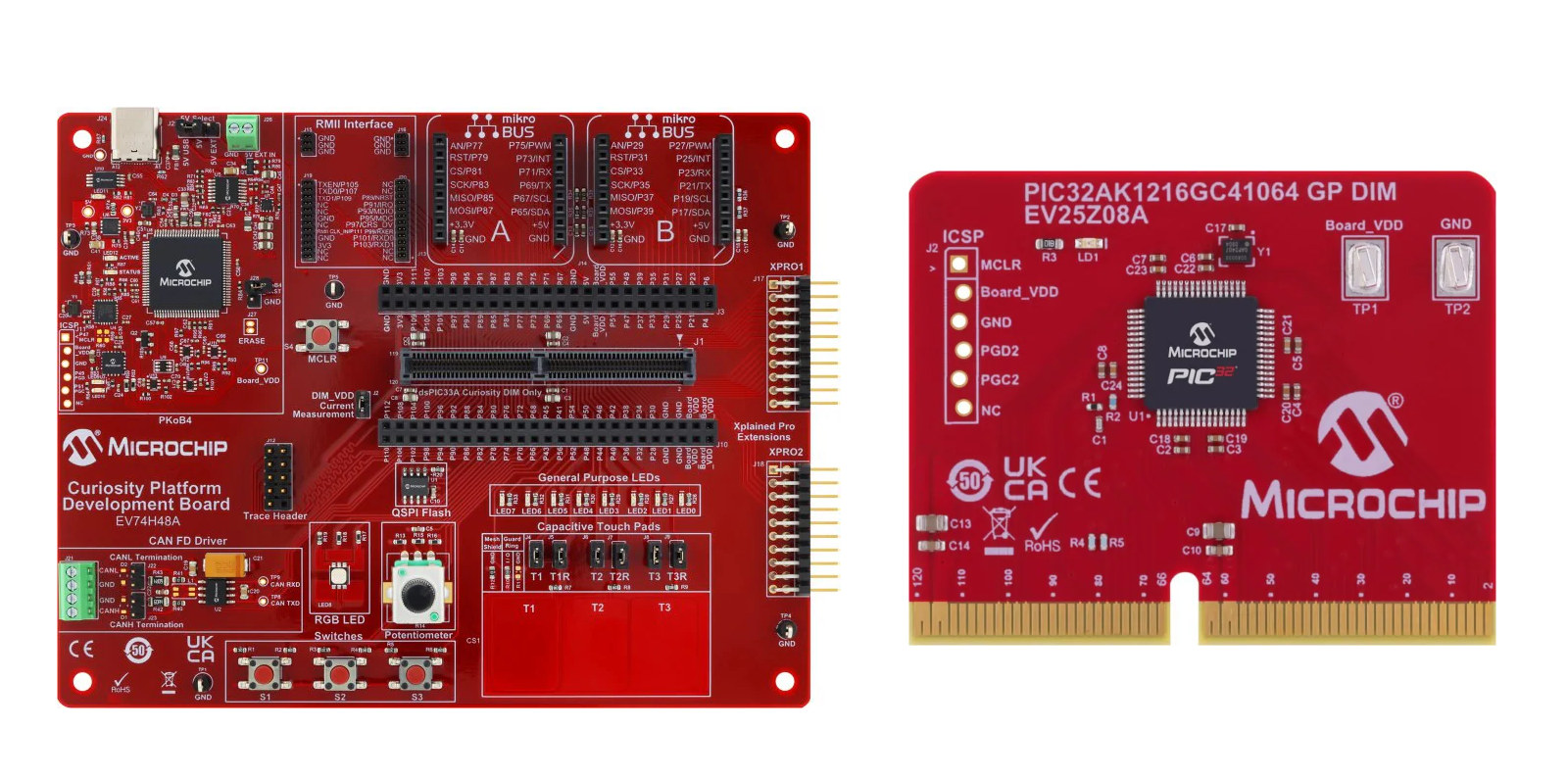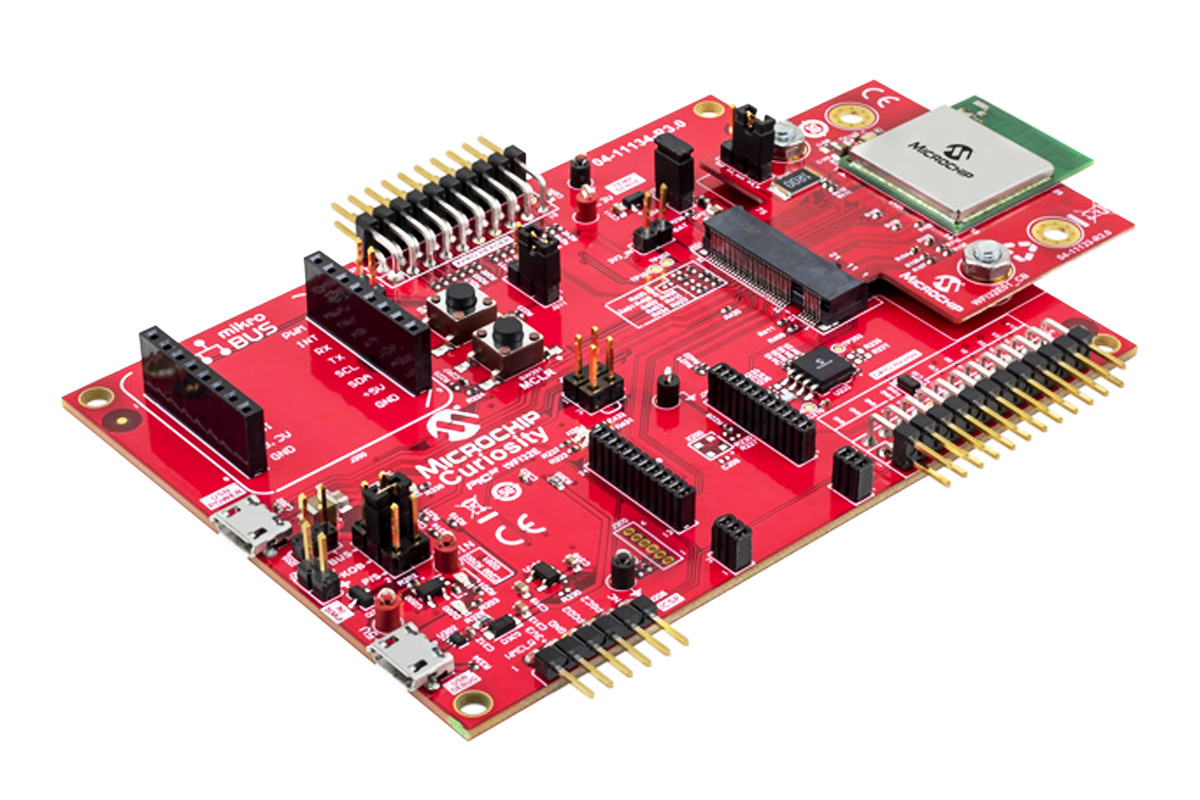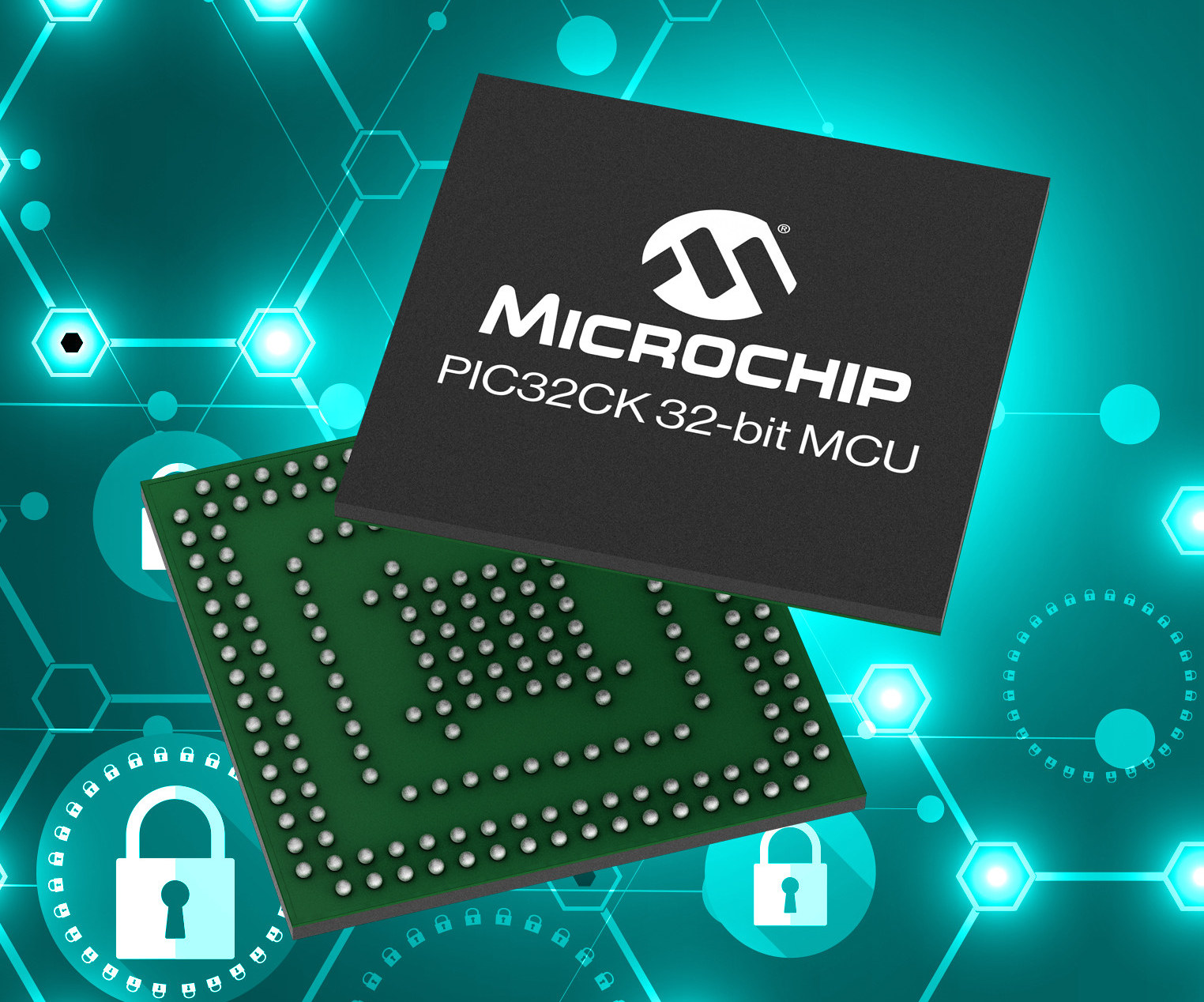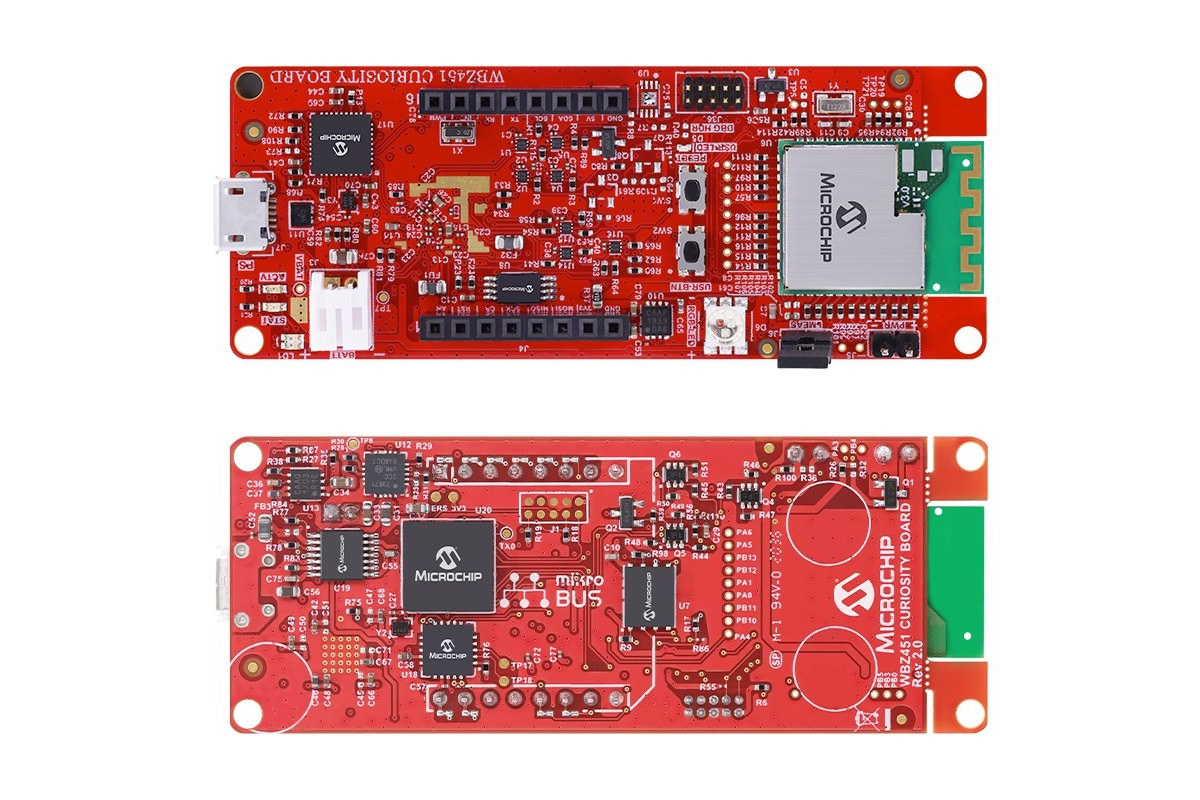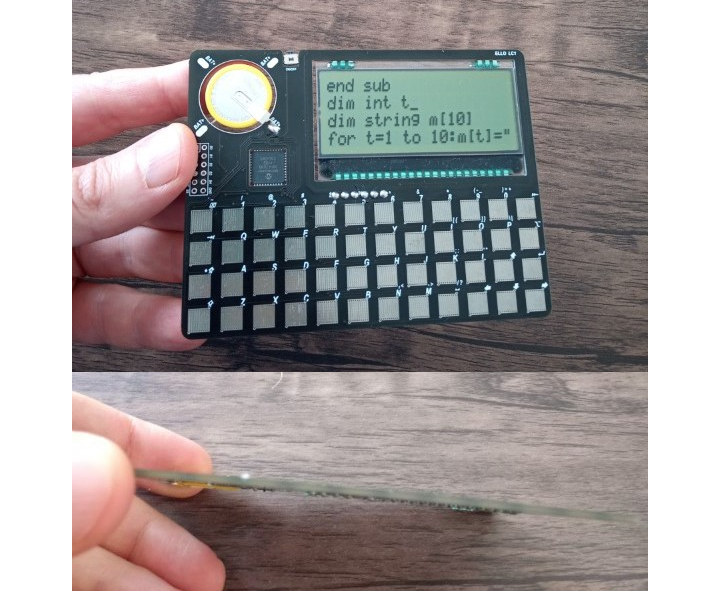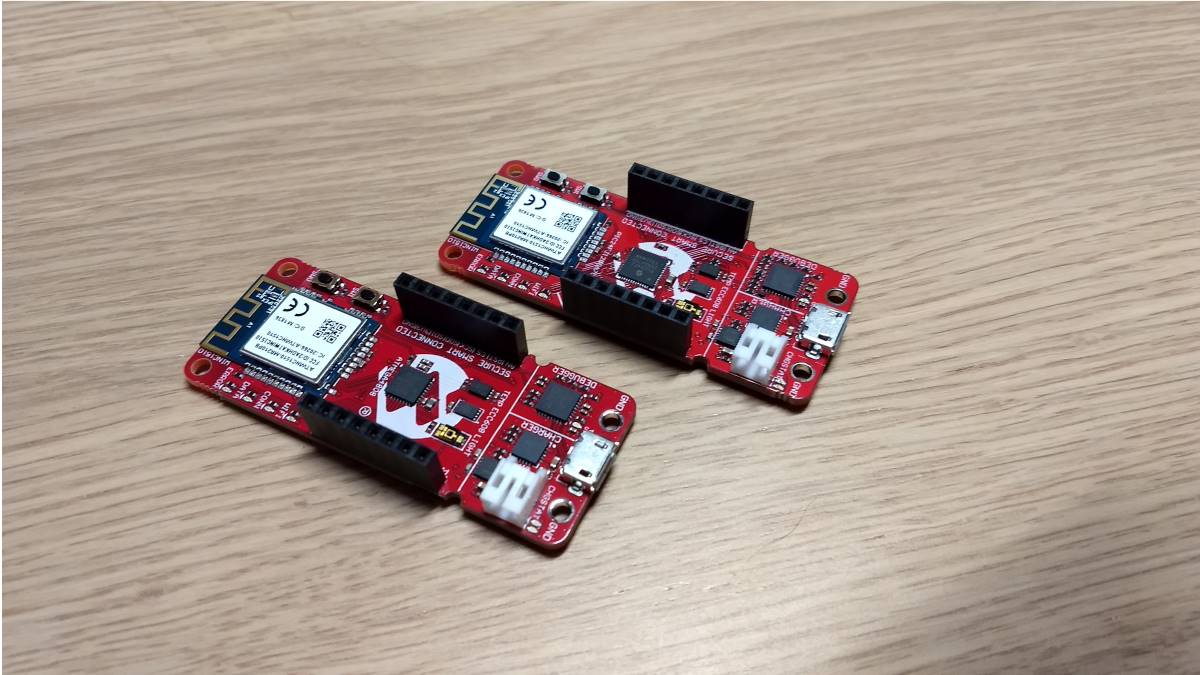While Microchip regularly releases PIC32 microcontrollers and evaluation kits, we don’t see that many PIC32 development boards from third parties. The SATURN NITRO is an exception, and the Arduino Nano-inspired development board is equipped with a 120 MHz PIC32MK general-purpose and motor control 32-bit MIPS microcontroller with 256KB SRAM, 1024KB flash, and 4KB EEPROM. The board closely follows the design of the official Arduino Nano board and can be seen as a beefed-up version with a much more powerful microcontroller delivering 198 DMIPS compared to the Microchip ATmega328P 8-bit microcontroller @ 16 MHz with just 2KB SRAM, 32 KB flash, and 1KB EEPROM, and a less capable I/Os. SATURN NITRO specifications: MCU – Microchip PIC32MK1024MCM064 Core – MIPS32 microAptiv MCU core @ 120 MHz with FPU; up to 198 DMIPS Memory – 256 KB SRAM Storage – 1MB flash, 4KB EEPROM USB – 1x Micro USB OTG port also used […]
Microchip PIC32A is a 32-bit MCU family with high-performance analog peripherals supporting up to 40 Msps
Microchip Technology PIC32A is a new family of 32-bit microcontrollers clocked at up to 200 MHz with high-speed analog peripherals that include up to 40 Msps 12-bit ADCs, high-speed 5 ns comparators and 100 MHz operational amplifiers for smart edge sensing. The PIC32A microcontrollers also feature up to 16KB RAM with ECC, up to 128KB flash, various I/O, and security and safety features that make them suitable for general-purpose applications across automotive, industrial, consumer, Artificial Intelligence (AI), Machine Learning (ML), and medical markets. Microchip PIC32A specifications: MCU core – 32-bit CPU @ up to 200 MHz with 64-bit FPU, instructions optimized for speed and program code size Memory – Up to 16KB RAM with ECC Storage – Up to 128KB flash with 64x 128-bit OTP area Peripherals 4x PWM generators with up to 2.5ns resolution 3x 4-wire SPI 2x I2C 3x UART; automated UART handling support for LIN 2.2, Digital […]
Microchip PIC32MZ-W1 is a 32-bit MIPS WiFi MCU with 60+ GPIO, USB, CAN Bus, Ethernet, and more
Microchip recently released the PIC32MZ-W1 wireless MCU along with 20 other WiFi parts, including WiFi MCUs, link controllers, network controllers, and plug-and-play modules. Among them, the PIC32MZ-W1 wireless MCU is the most interesting because of its 32-bit MIPS microAptiv M-class core running at up to 200MHz, advanced hardware security features, and integrated Microchip Trust Platform for secure cloud authentication. Over the years ESP32 MCUs have become the go-to choice for wireless applications. Still, one problem we always have with ESP32 SoCs is their limited GPIO option due to their strapped-out pin structures. But this new MCU has over 60 GPIO pins to work with along with Ethernet MAC, USB, CAN Bus, CANFD, SPI, I2C, SQI, UART, ADC, JTAG, and more. PIC32MZ-W1 wireless MCU specifications MCU MIPS32 M-Class core clocked at 200 MHz 16KB I-Cache, 16KB D-Cache microMIPS mode (up to 35% smaller code size) DSP extensions (4x 64-bit accumulators, single-cycle […]
Microchip PIC32CK 32-bit Arm Cortex-M33 MCU combines Hardware Security Module with Arm TrustZone for IoT cybersecurity compliance
Microchip PIC32CK is a new family of 32-bit Arm Cortex-M33 microcontrollers clocked up to 120 MHz with Arm Trustzone and an optional integrated Hardware Security Module (HSM) that can help companies meet the cybersecurity requirements for consumer IoT devices and critical infrastructure mandated in the US, Europe, and other countries. Two sub-families are available with the PIC32CK GC and PICK32CK SG with the latter integrating the HSM, and the company claims it is the first 32-bit device on the market that combines an HSM with TrustZone technology for optional security. The PIC32CK is also said to support ISO 26262 functional safety and ISO/SAE 21434 cybersecurity standards. Microchip PIC32CK specifications: MCU core – Arm Cortex-M33 clocked at up to 120 MHz with 4KB combined instruction and data cache, TrustZone security Memory and Storage 128KB, 256KB, or 512KB SRAM 512KB, 1MB, or 2MB flash 128KB boot flash memory 64KB of configuration flash […]
Microchip PIC32CZ CA 300 MHz Arm Cortex-M7 MCU features a Hardware Security Module (HSM)
Microchip PIC32CZ CA is a new family of Arm Cortex-M7 microcontrollers with the PIC32CZ CA90 integrating a Hardware Security Module (HSM), and the PIC32CZ CA80 doing without one. The HSM in the PIC32CZ CA90 provides advanced security for industrial and consumer applications and operates as a secure subsystem with a separate MCU on board that runs the firmware and security features including hardware secure boot, key storage, cryptographic acceleration, true random number generator, and more. Microchip PIC32CZ CA key features and specifications: MCU core – Arm Cortex-M7 clocked at up to 300 MHz with 16KB ECC-protected instruction and data L1 cache, up to 256Kb of Tightly Coupled Memory (TCM): 128 KB each of ECC-protected Instruction and Data TCM Memory 512KB or 1MB SRAM with ECC, 8KB SRAM for backup mode 2MB, 4MB, or 8MB flash 2x 80KB boot flash memory 16-bit external bus interface (EBI) – Static memory controller for […]
WBZ451 Curiosity Board features Microchip PIC32CX-BZ2 BLE and Zigbee 3.0 microcontroller
Microchip WBZ451 Curiosity Board features the company’s Microchip’s WBZ451PE Bluetooth Low Energy 5.2 and Zigbee 3.0 RF module based on the new Microchip PIC32CX-BZ2 32-bit Arm Cortex-M4F wireless microcontroller. WBZ451 Curiosity Board (EV96B94A) specifications: Wireless module – WBZ451PE Bluetooth Low Energy and Zigbee RF Module with Microchip PIC32CX-BZ2 32-bit Arm Cortex-M4F wireless microcontroller @ up to 64 MHz, 128KB RAM, 1MB flash, 2.4 GHz radio for Bluetooth LE 5.2 and 802.15.4 (Zigbee 3.0) Tx output power – Up +12 dBm Rx sensitivity – Up to -103 dBm PCB antenna 29x I/O pins Storage – 64Mbit QSPI flash Expansion – mikroBUS socket for MikroElectronika Click adapter boards Sensor – Microchip MCP9700A analog voltage temperature sensor Debugging On-board Programmer/Debug Circuit using PICkit On-board 4 (PKoB4) based on Microchip SAME70 MCU On-board USB to UART Serial Converter with Hardware Flow Control based on Microchip MCP2200 10-pin Arm Serial Wire Debug (SWD) header for […]
ELLO LC1 – A 2mm thin DIY “computer” based on Microchip PIC18 8-bit MCU
We often write about business card or credit card-sized boards, but it’s only true for 2D dimensions, as most boards are over a centimeter thick, with possibly the thinnest we’ve covered being the Khadas Edge2 SBC that’s just 7mm thick. So Kn/vD took it upon himself to build a DIY computer that was really about the size of a credit card, and came up with the ELLO LC1 based on a Microchip PIC18 8-bit microcontroller, featuring an integrated display and keyboard, and powered by a coin-cell battery. It’s just 2mm thin. ELLO LC1 specifications: MCU – Microchip PIC18 (PIC18F47Q83-I/PT) 8-bit microcontroller with 13KB RAM and 128KB flash, out of which 64KB are reserved as user file storage Display – 20×4 character text panel (Display Visions EADOGM204N) Keyboard – 48x touch panels on the PCB Expansion – 12-pin unpopulated header for debugging (ICSP) and GPIO expansion Misc – Power button Power […]
IoT development board comes with AVR or PIC MCU, WiFi module
Microchip AVR-IoT and PIC-IoT development boards have AVR and PIC MCUs respectively, which enables a simple interface between embedded applications and the cloud. The IoT development boards can securely transfer data to Amazon Web Services (AWS) IoT platform with a WiFi connection. The IoT development boards also include an onboard debugger which can be used to program and debug the MCUs without any need for external hardware. The IoT development boards also have an integrated lithium battery charger, which makes it a rechargeable device and allows easier deployment for a “ready-to-go solution.” The AVR-IoT WA development board integrates the ATECC608A CryptoAuthentication chip for security protocols and the ATWINC1510 Wi-Fi network controller for connectivity. The development board combines the ATmega4808 MCU 8-bit AVR MCU running at up to 20 MHz and offers a wide range of flash sizes up to 48 KB. The unit uses a “flexible and low-power architecture, including […]


